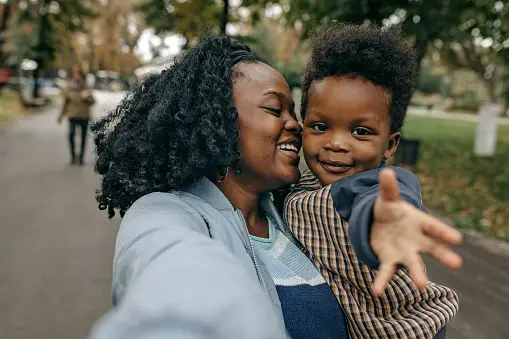As an African immigrant mum, it is natural to experience a cultural shock upon your arrival in the U.K. Parents in Nigeria are more prone to enforcing stricter discipline and adopting a structured family unit with assistance from people in the community. At the same time, children learn by pushing boundaries in the UK, and community involvement is frowned upon here.
What is social service in the UK?
In the United Kingdom, social services are local government departments saddled with the responsibility of providing a wide range of services to individuals and families who require support in their daily lives. Local authorities make Social services available based on need, and eligibility for services is decided on a case-by-case basis.
People can apply for social services by inquiring from their local authority or visiting the GOV.UK website. Social services play a vital role in guaranteeing that individuals and families in the UK get the support they need to thrive independently and fulfill their potential.
It is also crucial for you as an African mum in the UK to familiarise yourself with social services for the following reasons:
- You can learn about your entitlements and rights as a resident of the UK and get help settling into the UK, as social services can provide information and advice on many topics, such as securing housing, enrolling your children in school, and registering with a doctor.
- You can also access support for your children as social services provide a wide range of support. This includes education, childcare and healthcare. This support goes a long way in helping you remain assured that your children can thrive in the UK.
- Social services also allow you to connect with other African mums from your home country. This can avail you of myriad opportunities like building friendships, sharing experiences and providing each other with mutual support.
Duties and responsibilities of the UK social services
The duties and responsibilities of UK social services can be divided into two unique categories: safeguarding and promoting well-being.
Safeguarding:
- Protecting adults and children from harm and possible danger: Social services have a paramount duty to protect adults and children from harm, which includes emotional, physical, and sexual abuse, abandonment, and exploitation. They partner with individuals, families, and other agencies to pinpoint and address harm risks and provide support to victims.
- Investigating safeguard concerns: Social services investigate safeguard concerns brought to their notice. They analyse the risk of harm and take necessary action to protect the individual, including working with the police or other agencies.
- Supporting victims of abuse and neglect: Social services provide support to victims of neglect and abuse, including therapy, counselling, and practical assistance. They also work with victims to develop safety plans and access relevant services.
Promoting well-being comprises of:
- Assessing and meeting social care needs: Social services analyse the social care needs of families and individuals and arrange or provide the services they need to live independently and safely in their communities. This may include providing intimate care, support with household tasks, and assistance accessing education, employment, and healthcare.
- Promoting the well-being of adults: Social services promote and facilitate the well-being of adults by providing a range of services, including daycare, respite care, and support for caregivers. They also work with adults to enhance their skills and independence and to access opportunities for social interaction and engagement.
- Supporting children and families: Social services support children and families by providing a plethora of services, including family therapy, parenting support, and support for children with disabilities. They also work with families to develop parenting skills, manage finances, and access housing and other essential services.
Reasons why social services take children from African immigrant parents
Social services in the UK may intervene in a family situation if they have concerns about a child's safety and well-being. This can happen regardless of the parents' ethnicity or origin. The reasons for intervention are typically based on concerns about neglect, abuse, or exploitation.
Neglect: This is defined as failure to provide for a child's basic needs, such as food, clothing, shelter, and medical care. It can also include an absence of emotional care and attention.
Abuse: This is any form of physical, emotional, or sexual harm or mistreatment. It can also include neglect.
Exploitation: Exploitation is the use of a child for another person's gain, often financial. It can include child labour, trafficking, and forced marriage.
If social services have concerns about a child's safety and well-being, they will investigate the situation and may take action to protect the child. This could include supporting the family, removing the child from the home, or pursuing legal action against the parents.
What to do when your child is taken into social care
If your child is taken into UK social care, it’s important to understand your rights and the process involved. Here’s a summary of what you can do:
- Seek legal advice: Contact a solicitor specialising in family law as quickly as possible. They can guide you through the legal process, protect your rights, and represent you in court if necessary.
- Understand the reasons: Social services will explain the reasons for taking your child into care. They will assess the situation and determine if your child is at risk of harm or neglect.
- Cooperate with social services: Contact the social worker assigned to your child’s case. They can support and help you understand the care plan for your child.
- Maintain contact with your child: You have the right to maintain regular contact with your child unless there are specific reasons for restricting contact. This could include supervised visits, phone calls, or letters.
- Attend court hearings: If care proceedings are initiated, you must attend court hearings. These hearings will determine whether your child should remain in care.
- Seek support for yourself: Dealing with your child being taken into care can be emotionally challenging, so you should seek support from family, friends or support groups for parents in similar situations.
- Consider independent advocacy: If you feel overwhelmed or need additional support, consider seeking help from an independent advocate. They can provide guidance and support throughout the process.
- Understand the care plan: The social worker will develop a care plan for your child, outlining their needs, education, and placement arrangements. You should be involved in creating and reviewing this plan.
- Address concerns: If you have concerns about your child’s care or treatment, raise them with the social worker or foster carer. You can also make a formal complaint to the local authority.
- Seek reunification: If your child’s circumstances change and you want them to return home, you can apply for reunification. This will involve working with social services to demonstrate that you can provide your child with a safe and stable environment.
What happens if I lose the court case?
If you lose the court case against UK social care, there are a number of possible outcomes, depending on the case's specific circumstances. The court will make an order that is in the best interests of your child, which may include one of the following:
- A care order: This is the most serious outcome and means that the local authority will take your child into care. Your child will then be placed in foster care or a residential home.
- A supervision order: The local authority will supervise your child's care for a specified period. Your child will continue living with you, but the local authority will have the power to intervene if they have worries about your child’s welfare.
- A residence order: Your child will live with one of the parents, usually you, the mother.
- A child arrangements order: This is a more flexible order to make arrangements for your child's care, such as who the child will live with and how much contact your child will have with each parent.
The court will also consider to make an order for specific issue directions. These are directions that are specific to your child’s case and that are designed to address the concerns that the court has about your child's welfare. For example, the court may order you to attend parenting classes or to undergo a drug and alcohol examination.
If you are not happy with the outcome of the case, you can appeal the decision to the Court of Appeal. However, appeals are only given in cases where there is a clear error of law, or the court has decided in a way that is not in your child's best interests.
You need to understand your rights and responsibilities as a parent, access resources, and build a network for support. Also, you shouldn’t fear social services; they’re there to help. Seek assistance proactively. You should also build positive relationships with professionals and confidently voice your concerns and needs.










Comments